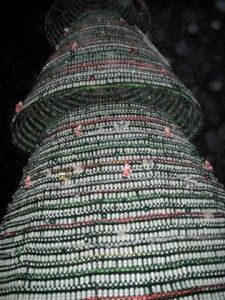
Christmas tree made up of Heineken beer bottles in Vietnam last year.
__________
The best reason to diet yet: So you don't have to drink this stuff. A Queensland boutique brewer has today made brewing history with the launch of BIGHEAD – Australia's first no-carb beer. BIGHEAD is the brainchild of Burleigh Brewing Company, an independent craft brewery based in Burleigh Heads on Queensland's Gold Coast.
__________
I saw this earlier this week:
German teens who are into boozing are getting a load of before-and-after coasters that are driving them sober.
One of the beer mats features photos of happy, sober youths on one side, and unconcious teens, bombed out of their minds and wallowing in puddles of their own vomit, on the flip side.
Another coaster has a boy showing off his muscle to chicks, and then there's the "B" side - with the same kid having passed out and [sprayed] in his pants.
__________
About fix years ago, I started drinking wine. I did it for a variety of reasons: stomach problems, variation, a sense that I ought to start developing a more mature palate, my parents drank it. But about two years, I got horribly sick the morning after drinking an eight-ounce glass of Pinot Grigio. I'm gun shy to this day (I've also discovered higher-end beers, which has been my alcohol staple for the past two years). Still, I hope to drink wine again some day, and I find wine far more interesting than I did, say, ten years ago. And I found this piece very interesting: Cork rot--the bane of the industry--might be dead.
There's news that a technology developed by NASA to remove contaminants from fruits and vegetables headed to the space station may also effectively remove TCA (2,4,6-trichloroanisole) from wine corks. Best of all, the process doesn't just filter the TCA, which would leave the possibility of it slipping through, it chemically destroys it.
If you're not familiar with TCA or corked wine, it's a big deal that most folks in the wine industry don't like to talk about. TCA occurs in natural cork; it's a contaminant (I think it's mold-generated) that doesn't show up until the cork is put in a bottle; when the bottle is opened and the wine is poured, it's pretty much nasty and undrinkable. If you ask folks in the wine or cork biz, it affects 1-3% of bottles (which is actually a huge number: imagine if 1-3 out of every 100 bottles of beer you got were just shite? Oh, wait, that's how craft beer was back in the 1990s...); if you talk to wine critics and industry analysts, it's more like 5-10%. A big problem when you're talking about flushing a $20 purchase down the crapper, and it's been a major component behind the move to screwtops, synthetic corks, and box wines.
But with the new technology, the move to alternatives may not be necessary. Read the rest at the link above.









